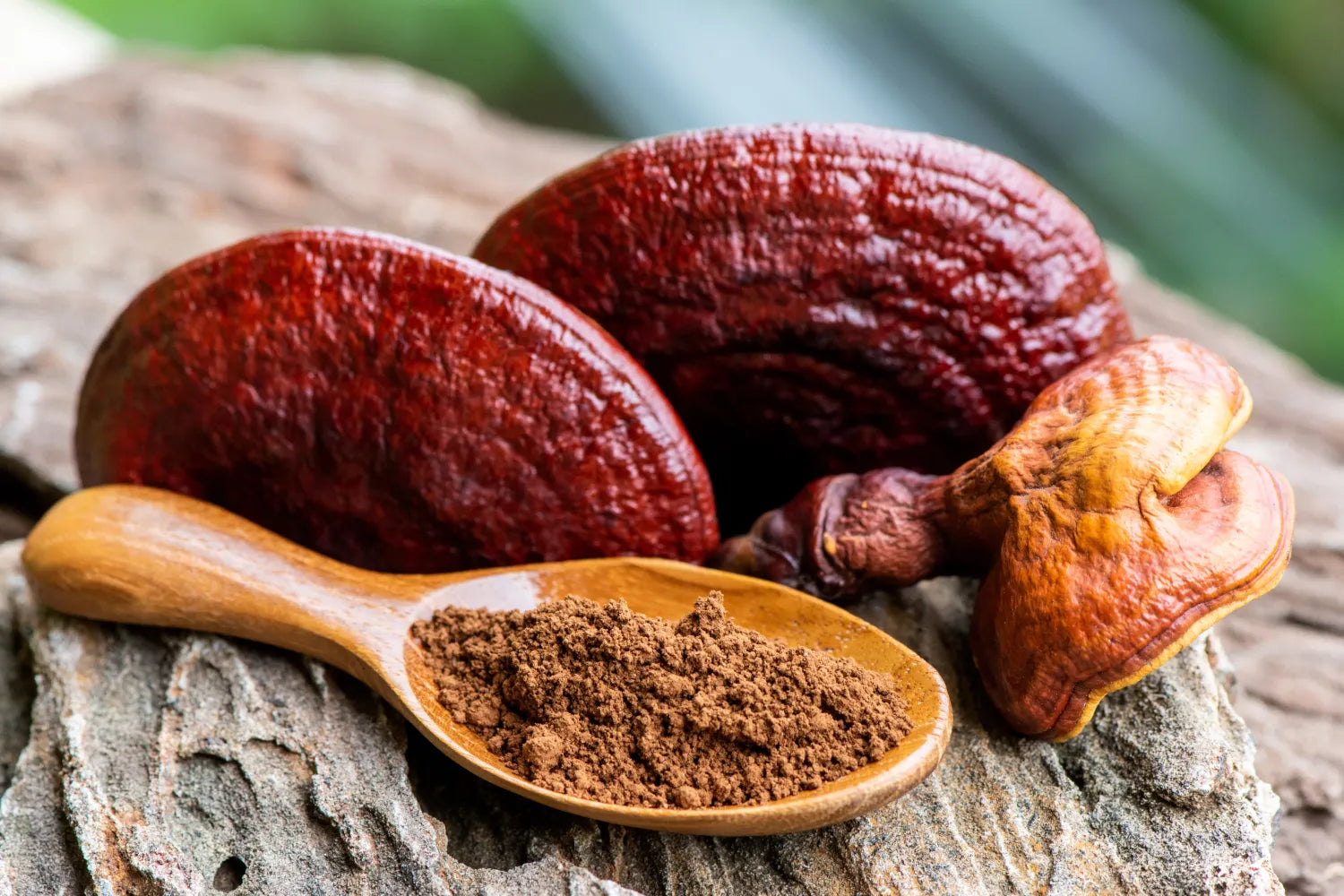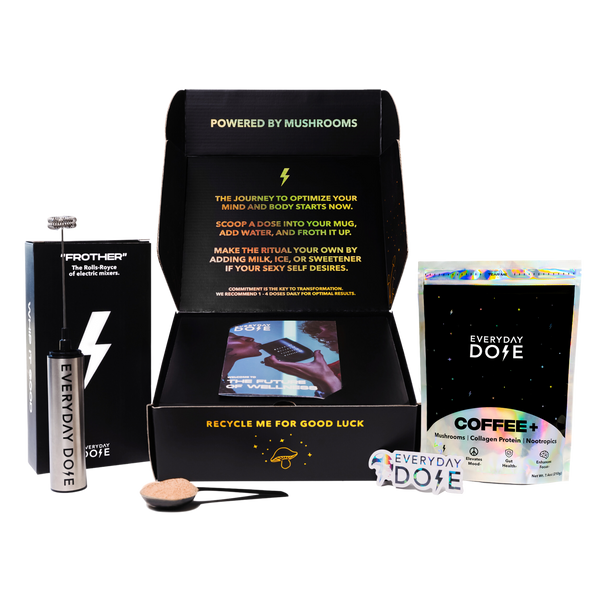Reishi vs. Chaga: What the Science Says

If you’re new to the world of functional mushrooms, there’s a lot to explore! There are so many medicinal mushrooms with even more benefits, and learning the differences between each type of mushroom can feel overwhelming.
However, just like you wouldn’t take melatonin to help you stay awake or caffeine to help you fall asleep, each mushroom has its own unique purpose. If you’re looking for specific benefits, it’s important to learn about your options so you can find one that fits your needs.
That’s why we’re here to discuss the differences between reishi and chaga mushrooms. But first, let’s make sure we’re on the same page about what reishi and chaga mushrooms are.
What Is Reishi Mushroom?
Reishi mushroom (known formally as Ganoderma lucidum) grows on dead trees around the world, especially in North America, Europe, and Asia. These mushrooms prefer hot and humid climates and have a bright red, orange, or brown color — sometimes, they have all three!
Reishi might be growing in popularity on this side of the pond, but it’s been used for hundreds of years in other cultures. For instance, practitioners of Traditional Chinese Medicine (TCM) use it to help ease sleeplessness and stress, as well as to support the immune system and overall health.
Benefits of Reishi
There are some ancient remedies that we’ve gotten rid of over the years because they aren’t as effective as people thought (think: bloodletting and mercury potions). However, there are also plenty of folk medicines that can have real health benefits, as demonstrated by current research. One of these remedies is reishi mushroom.
The benefits of reishi include:
- Supports the Immune System: Reishi mushroom can support the immune system by encouraging the body’s production of cytokines.
- Provides Antioxidant Properties: Reishi contains many antioxidant compounds that can fight against free radical damage and support long-term health.
- Supports a Healthy Blood Sugar: In animal studies, reishi extract helped support healthy blood sugar levels, but did not affect insulin.
- Encourages a Healthy Stress Response: Reishi mushrooms are adaptogens, which mean they can help our nervous systems adapt to stress.
What Is Chaga Mushroom?
Now that we know what reishi mushroom is, let’s move on to chaga. Chaga mushrooms grow on birch trees in cold climates, and can be found in the northern United States, some parts of China, and northern parts of Europe.
Chaga mushrooms are black and have a rough, bumpy texture similar to charcoal. They don’t look like the mushrooms you might be used to seeing — instead, chaga fruiting bodies are round masses that grow out of the sides of trees.
Benefits of Chaga
Similar to reishi, chaga has been used in folk medicine for hundreds of years. In Eastern medicine, this mushroom was used to support the immune system, encourage healthy skin, and provide mental clarity. Just like reishi, recent research is now showing that the benefits of chaga are more than just figments of our imagination.
The benefits of chaga include:
- Supports Hair and Skin: Chaga mushroom contains melanin, which can support healthy hair and skin. It also contains compounds that can encourage hair growth.
- Provides Superior Antioxidant Support: Chaga is rich in incredibly powerful antioxidant compounds that can support long-term, full-body wellness.
- Supports the Immune System: Chaga can support the body’s production of white blood cells, which fight off infection and keep us feeling healthy and energized.
- Supports Healthy Blood Sugar: Finally, one animal study found that chaga mushrooms may help support healthy blood sugar and insulin levels.
Reishi vs. Chaga: Which Is Better?
It’s clear that both of these mushrooms pack mighty benefits — so which should you take? Our answer takes the form of another question: What benefits are you looking for?
There is some overlap between reishi and chaga. Both mushrooms provide antioxidant support, can encourage immune system health, and may even support healthy blood sugar. However, reishi also has adaptogenic properties, while chaga can support hair and skin health.
Ultimately, the answer comes down to what works best for you. Try them both and see how you feel. Our personal favorite is chaga because it has been shown time and time again to encourage immune system health. We also love it because the antioxidants it features are incomparable with other mushrooms.
How Can You Take Reishi and Chaga?
With any natural supplement, the effects tend to build up over time. This means that consistency is key when it comes to experiencing the benefits for yourself.
There are many things to look for in a mushroom supplement. For instance, what was the mushroom fed? Was the supplement made with mycelium or fruiting bodies? And were the mushrooms properly extracted?
However, one of the most important things is convenience. Pick one that you know you’ll take every day. For instance, our Mushroom Coffee+ features chaga and lion’s mane mushrooms, as well as collagen protein, coffee extract, and L-theanine, all in one delicious cup of coffee. It’s tasty, it’s simple, and it’s oh-so-easy.
It’s worth noting here that if you’re pregnant, breastfeeding, taking medications, have a preexisting health condition, or have a known mushroom allergy, you should talk to your doctor before starting any supplement — even mushroom coffee. Also, if you have known kidney issues, you should check with your provider before taking chaga.
The Bottom Line
Reishi and chaga are both medicinal mushrooms that come with some pretty sweet benefits. And, while there are some similarities between the two, they also have their own niches when it comes to health and wellness. For instance, reishi can support feelings of relaxation, while chaga can encourage healthy hair and skin. Plus, chaga contains powerful antioxidants.
Ultimately, the choice is yours. If you’d like to try chaga, you might like one of our super-delicious and ultra-convenient mushroom blends. Shop all of our mushroom products today to find one that works for you.
Sources:
Ganoderma lucidum (Lingzhi or Reishi) | NIH
5 Reasons to Consider Chaga Mushrooms | American Association of Naturopathic Physicians
What are adaptogens and should you be taking them? | UCLA Health








